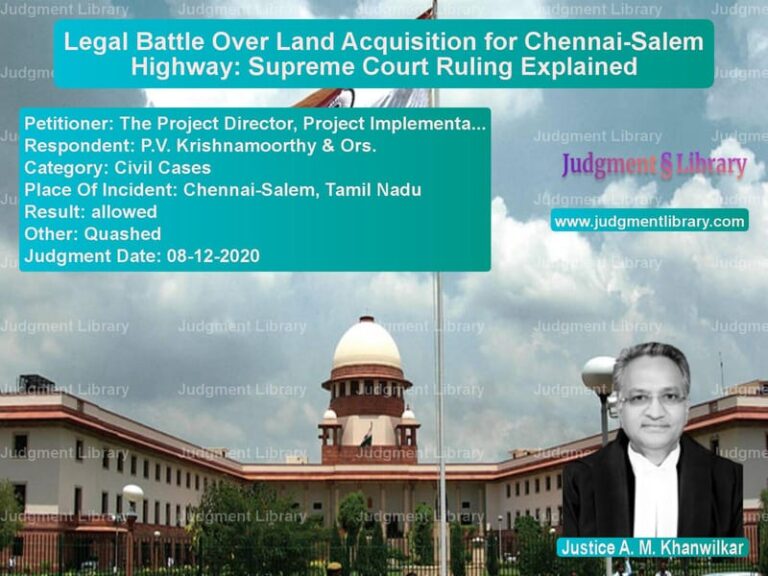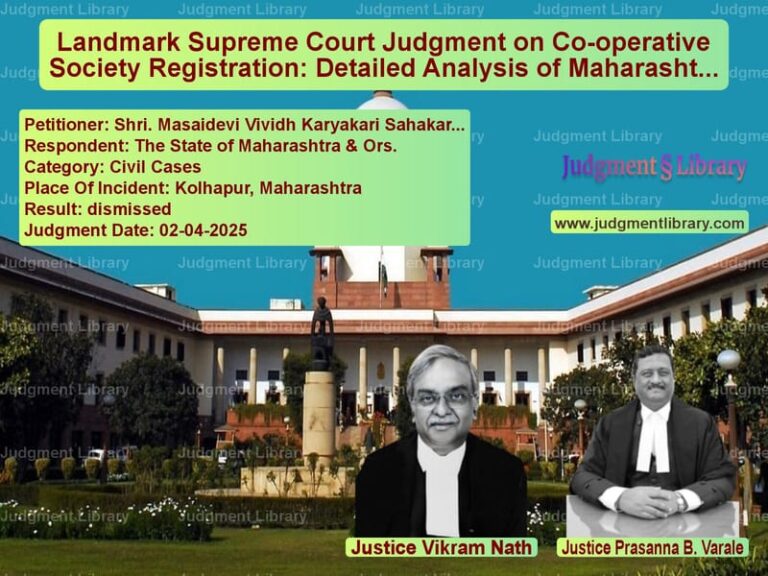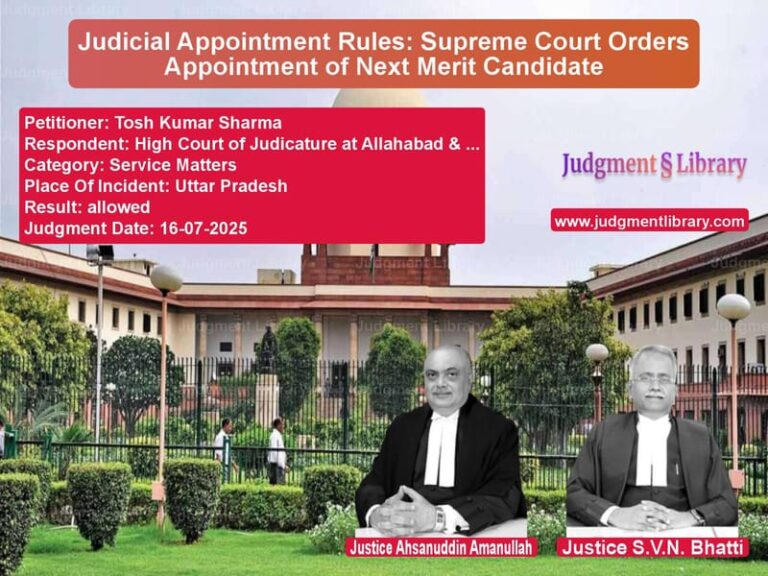Supreme Court Acquits Former Bank Manager in Corruption Case Due to Lack of Evidence
The Supreme Court recently delivered a landmark judgment in the case of N. Raghavender vs. State of Andhra Pradesh, CBI, where it overturned the conviction of a former bank manager accused of corruption, fraud, and criminal misconduct. The case revolved around financial irregularities committed at the Sri Rama Grameena Bank, Nizamabad Branch, and raised crucial questions about the standard of proof required in corruption cases.
Background of the Case
The case against N. Raghavender, the appellant, originated from allegations of financial mismanagement and corruption during his tenure as Branch Manager at Sri Rama Grameena Bank, Nizamabad, from May 1990 to September 1995. He was accused of allowing fraudulent withdrawals from an account held by Nishita Educational Academy, misusing bank funds, and falsifying records.
The case came to light when an audit in 1995 revealed serious financial irregularities. The bank management lodged a complaint with the Central Bureau of Investigation (CBI), which led to the prosecution of Raghavender under:
- Sections 409 (Criminal Breach of Trust by a Public Servant), 420 (Cheating), and 477A (Falsification of Accounts) of the Indian Penal Code (IPC).
- Section 13(2) read with Section 13(1)(d) of the Prevention of Corruption Act, 1988.
Allegations Against the Accused
The prosecution alleged that:
- Raghavender, along with two other accused, conspired to allow withdrawals of up to ₹10 lakh from the Nishita Educational Academy’s account despite insufficient funds.
- He issued loose-leaf cheques (cheques not issued to the account holder) to facilitate these transactions.
- He prematurely closed two Fixed Deposit Receipts (FDRs) worth ₹14 lakh belonging to a bank customer, B. Satyajit Reddy, and transferred the amount to Nishita Educational Academy’s account without authorization.
- He falsified bank records to cover up these fraudulent transactions.
Trial Court and High Court Verdicts
The Special Judge, CBI Cases, Hyderabad, convicted Raghavender and sentenced him to five years of rigorous imprisonment. However, his co-accused, Sandhya Rani (Clerk) and C. Vinay Kumar (Treasurer of Nishita Educational Academy), were acquitted.
The Andhra Pradesh High Court upheld the conviction, agreeing with the trial court that Raghavender had misused his position as branch manager for financial gain. The court found that although no direct financial loss was caused to the bank, the accused had violated banking procedures and misused his authority.
Supreme Court’s Judgment
Raghavender challenged his conviction before the Supreme Court, which examined the evidence in detail and found several inconsistencies in the prosecution’s case. The Court made the following key observations:
1. Lack of Evidence on Criminal Breach of Trust (Section 409 IPC)
The prosecution failed to prove that the accused had personally misappropriated bank funds. The Court observed:
“The mere fact that financial irregularities occurred does not establish that the appellant had a dishonest intention or misappropriated funds.”
2. Absence of Mens Rea in Cheating Allegations (Section 420 IPC)
The Court held that:
“For an offense under Section 420 IPC, it must be proved that the accused acted with fraudulent intent from the outset. There is no conclusive evidence that the accused intended to cheat the bank.”
3. Failure to Prove Falsification of Accounts (Section 477A IPC)
The Supreme Court noted that while discrepancies in bank records existed, no independent evidence was presented to prove that Raghavender deliberately manipulated them. The Court ruled:
“Mere irregularities in accounting, without proof of intent to defraud, cannot sustain a conviction under Section 477A IPC.”
4. Non-Examination of Key Witness (B. Satyajit Reddy)
The prosecution’s failure to examine B. Satyajit Reddy, whose FDRs were allegedly misused, weakened its case. The Court observed:
“The best person to testify about the unauthorized encashment of FDRs was the account holder himself. The prosecution’s failure to present him as a witness raises serious doubts.”
5. No Financial Loss to the Bank
The Court emphasized that:
“There is no material on record to establish that the bank suffered financial loss due to the accused’s actions. On the contrary, the prosecution admits that all transactions were eventually accounted for.”
Final Verdict
Based on the lack of conclusive evidence, the Supreme Court acquitted Raghavender of all charges under the IPC and Prevention of Corruption Act. However, it upheld his dismissal from service, ruling that while his actions did not warrant criminal conviction, they constituted gross misconduct.
Key Takeaways from the Judgment
- Burden of Proof in Corruption Cases: The judgment reaffirms that prosecution must provide strong evidence to establish guilt beyond a reasonable doubt.
- Distinction Between Criminal Liability and Disciplinary Action: While the accused was acquitted of criminal charges, the Court upheld his dismissal, setting a precedent for handling similar cases.
- Importance of Examining Key Witnesses: The failure to present material witnesses can significantly weaken the prosecution’s case.
- Need for Clear Mens Rea in Cheating Cases: Fraudulent intent must be established at the outset of a transaction.
- Judicial Review of CBI Investigations: The Court criticized the CBI for conducting a flawed investigation and not securing vital evidence.
Conclusion
This judgment underscores the necessity of clear and conclusive evidence in corruption cases. While financial irregularities may justify departmental action, they do not automatically translate into criminal liability. The ruling is a significant precedent in corruption cases involving public servants and banking professionals, emphasizing the principle that suspicion, however strong, cannot replace proof beyond a reasonable doubt.
Petitioner Name: N. Raghavender.Respondent Name: State of Andhra Pradesh, CBI.Judgment By: Justice N. V. Ramana, Justice Surya Kant, Justice Hima Kohli.Place Of Incident: Nizamabad, Andhra Pradesh.Judgment Date: 13-12-2021.
Don’t miss out on the full details! Download the complete judgment in PDF format below and gain valuable insights instantly!
Download Judgment: n.-raghavender-vs-state-of-andhra-prad-supreme-court-of-india-judgment-dated-13-12-2021.pdf
Directly Download Judgment: Directly download this Judgment
See all petitions in Fraud and Forgery
See all petitions in Money Laundering Cases
See all petitions in Judgment by N.V. Ramana
See all petitions in Judgment by Surya Kant
See all petitions in Judgment by Hima Kohli
See all petitions in allowed
See all petitions in Quashed
See all petitions in supreme court of India judgments December 2021
See all petitions in 2021 judgments
See all posts in Criminal Cases Category
See all allowed petitions in Criminal Cases Category
See all Dismissed petitions in Criminal Cases Category
See all partially allowed petitions in Criminal Cases Category







